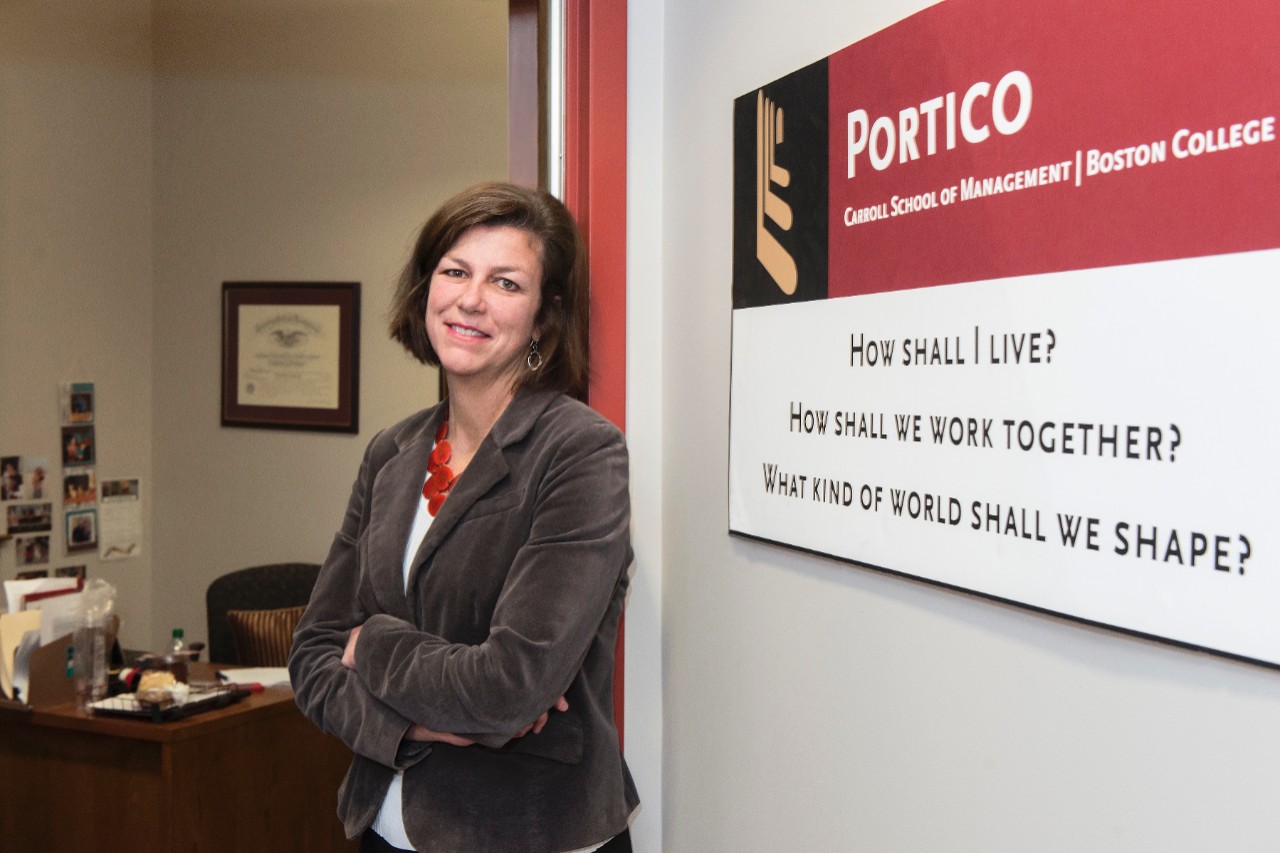Be attentive. Be reflective. Be loving.
Those words of advice are not what you’d expect to hear in a typical management class, but they sum up the aims of the Carroll School’s signature Portico course, according to an article published in the latest edition of the Journal of Jesuit Business Education. Authored by five Portico faculty members, the article describes a unique approach to business ethics embodied in the required course taken by every first-year undergraduate student.

Amy La Combe in the Portico offices in Fulton Hall.
“Portico attempts to develop students’ moral imaginations by encouraging them to consider multiple, often contradictory views and to examine their own most deeply held beliefs,” write Sarah Cabral, Joseph Cioni, Jeremy Evans, Amy LaCombe, and Michael Smith, referring in part to the emphasis on self-reflection. The course was piloted in the fall of 2008 and became official one year later.
As the name suggests, Portico is the port of entry into management education for all Carroll School undergraduates. With 35 sections taught by seven faculty members, the three-credit course looks at business from a global, multidisciplinary as well as ethical and social perspective. It has several components including academic advising, small class sizes, and evening events that feature outside speakers and bring together larger groups of Portico students, among other features.
The article recounts decisions made in forging the Portico model. For example, the designers of Portico chose to not only make philosophical reflection a key thrust of the class but also to have this component taught by business school faculty rather than by philosophy professors outside the School. The idea behind this move was to dispel the notion that such reflection is somehow external to good management thinking, “hopelessly idealistic and inapplicable” to real-world situations, the authors explain. Indeed, Portico is “not so much a business ethics class as it is a philosophically reflective introduction to business,” they write.
In light of its relentlessly multidisciplinary approach, the Carroll School also decided to house the course in a new department connected to the dean’s office and the School’s Honors Program (which is why there’s a Portico faculty).
Most of the article elaborates on learning objectives encapsulated in the themes cited above—the need to be attentive, reflective, and loving. “These objectives are not static but rather a continual, lifelong process,” the authors say.
Under the subheading of attentiveness, the article discusses how Portico students are introduced to the global context of today’s capitalism, including market successes and failures as well as the ethics of supply chains.
On the theme of reflection, the authors underscore the importance of helping students gain greater insight into their experiences and choices both in and apart from the course. In that connection, Portico students engage in a version of the Examen, a centuries-old Jesuit meditation in which they reflect on what they’re grateful for and what went right or wrong during the week.
The authors note that “Be Loving” might seem “an unusual theme for a business school course,” but it’s central to the Portico design. It raises the ethical bar by calling on business people to demonstrate a loving concern not just for the interests of shareholders but for all stakeholders, including employees, communities, and the environment.
The theme is also a challenge to think about much more than financial returns or self-interest. In this way, “be loving” is modeled by faculty members who, ideally, “will genuinely care about our students and want the best for them with nothing in return other than to see them blossom as they strive to be the people they desire to be,” the article says.
The Portico experiment continues.
Its faculty and the Carroll School administration “still wrestle with how all students can best revisit the themes of Portico in the sophomore, junior, and senior years to ensure that our students graduate as more attentive, reflective, and loving students,” the authors say at the end of the article. “It is a continual, evolving process for us, as it should be for our students.”


